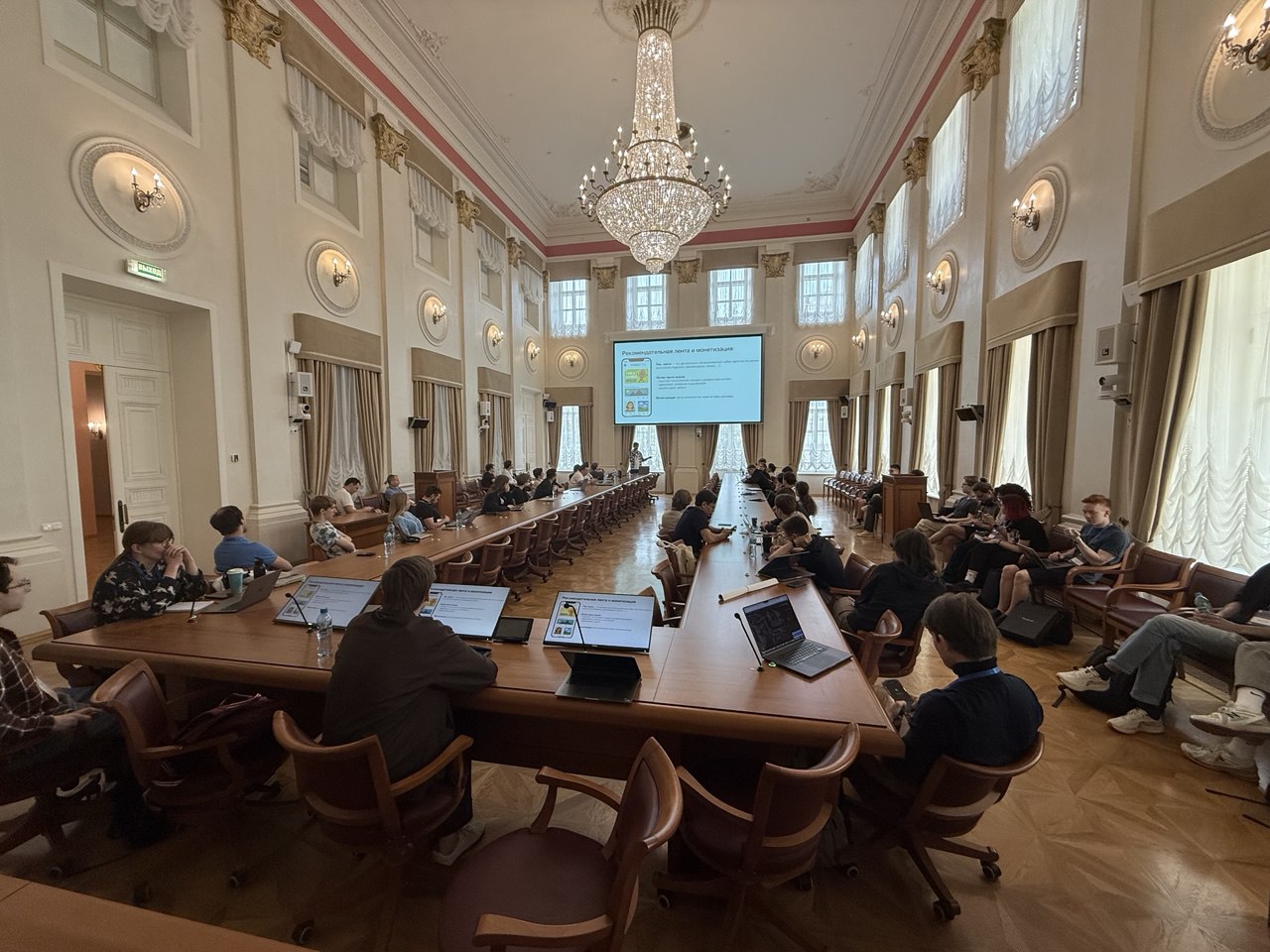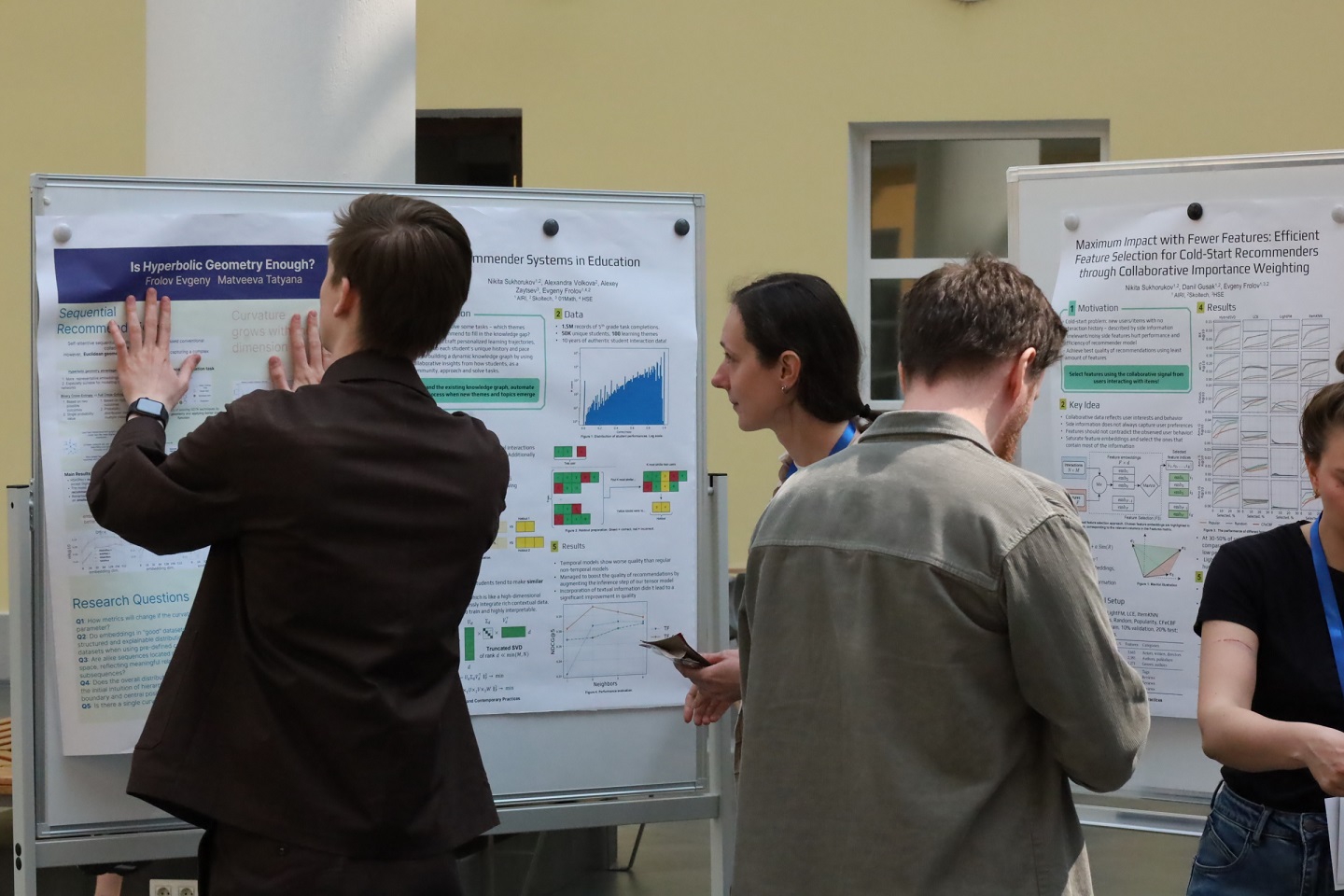Recommender Systems: New Algorithms and Current Practices

The AI and Digital Science Institute at the HSE Faculty of Computer Science hosted a conference focused on cutting-edge recommender system technologies. In an atmosphere of active knowledge sharing among leading industry experts, participants were introduced to the latest advancements and practical solutions in recommender model development.
The conference brought together experts in the development of recommender systems—a promising technology with applications in both academia and industry. The conference was organised by the Laboratory for Matrix and Tensor Methods in Machine Learning headed by Maxim Rakhuba.

Evgeniy Frolov
According to Evgeniy Frolov, Senior Research Fellow at the laboratory and Head of the Personalisation Technologies Group at AIRI, 'The second iteration of the Recommender Systems Conference brought together a community of industry and academic experts, highlighting both a strong technological foundation and a growing interest in the field. The conference programme covered a wide range of topics, from recent research submitted to RecSys 2025—the leading conference on recommender systems—to in-depth reviews of production architectures used by major companies. A notable highlight was the roundtable discussion on how well-tuned single-stage solutions could serve as a stepping stone toward a unified, LLM-oriented recommender paradigm. From my perspective, the main outcome of the conference is the emergence of a community of industry and academic experts that enables honest hypothesis testing on real-world data and provides immediate insight into its value for both business and science.'

At a training seminar held during the conference, AI researchers Gleb Mezentsev and Danil Gusak provided a detailed overview of modern approaches to building scalable and consistent recommender systems. Participants explored the latest approaches to building efficient data pipelines for processing large amounts of data, as well as the complexities of integrating recommender solutions into real-world business processes.
Sergey Ermilov, Senior Developer at VK AI, presented research findings on the impact of advertising integrations on recommender service effectiveness and outlined successful strategies for content relevance and advertising returns.
Ruslan Israfilov, Sber RecSys Team Leader, delivered a presentation titled 'The Next Step in AI Evolution: LLM-based Multi-Agent Systems,' highlighting the benefits of integrating multiple intelligent agents to improve recommendation accuracy and better understand user behaviour.

Marina Ananyeva
Marina Ananyeva, Head of RecSys at the Laboratory for Matrix and Tensor Methods in Machine Learning, discussed the shift from traditional batch learning methods to online recommender models. She presented practical cases illustrating the transition to online learning, underscoring how models adapt more quickly to changes in audience preferences.
Alexey Vasilev, Executive Director of Data Science at the Sber AI Lab, emphasised the critical role of proper data preparation in developing high-quality recommender systems. His presentation covered topics such as model architecture selection, training process optimisation, and algorithm result interpretation. 'The conference was attended by experts from leading Russian companies. I know many of the speakers personally, so it was a pleasure to reconnect,' says Alexey Vasilev. 'The excellent variety of presentations—from both industry and academia—along with the poster session, made the event truly interesting. It was great to see the discussions continue during the breaks, once again confirming that recommender systems are a highly relevant and in-demand topic. I believe the conference was a success.'
In his presentation, Evgeniy Frolov proposed an innovative approach to enhancing recommender system performance by dynamically adjusting the structure of internal data representations—a method that can significantly improve recommendation quality and reduce the likelihood of errors. 'At the conference, I presented our new paper introducing a self-supervised approach to training recommender models. We adapted the Barlow Twins method, originally developed in the field of computer vision, for transformer-based recommender architectures. In particular, beyond improving prediction quality, we were the first to identify the effect of adaptive collapse in representations: depending on the structure of user preferences, the algorithm automatically adjusts the diversity of its outputs. In datasets without clear clusters of user tastes, it generates a broad range of recommendations, while in scenarios with strictly defined, specific preferences, it focuses on the most relevant products—delivering more accurate choices compared to existing methods,' explains Frolov.

The conference concluded with a poster session in the atrium of HSE University's building on Pokrovsky Bulvar, where participants discussed the presented research in an informal setting and exchanged ideas on emerging directions in recommender technology development.
This was the second Conference on Recommender Systems hosted by HSE University, and it is becoming a key platform for discussing scientific breakthroughs and technological innovations in AI and the digital economy. The event contributes to the advancement of the recommender systems industry and the emergence of a new generation of professionals in the field.
See also:
HSE Researchers Create Genome-Wide Map of Quadruplexes
An international team, including researchers from HSE University, has created the first comprehensive map of quadruplexes—unstable DNA structures involved in gene regulation. For the first time, scientists have shown that these structures function in pairs: one is located in a DNA region that initiates gene transcription, while the other lies in a nearby region that enhances this process. In healthy tissues, quadruplexes regulate tissue-specific genes, whereas in cancerous tissues they influence genes responsible for cell growth and division. These findings may contribute to the development of new anticancer drugs that target quadruplexes. The study has been published in Nucleic Acids Research.
Mathematician from HSE University–Nizhny Novgorod Solves Equation Considered Unsolvable in Quadratures Since 19th Century
Mathematician Ivan Remizov from HSE University–Nizhny Novgorod and the Institute for Information Transmission Problems of the Russian Academy of Sciences has made a conceptual breakthrough in the theory of differential equations. He has derived a universal formula for solving problems that had been considered unsolvable in quadratures for more than 190 years. This result fundamentally reshapes one of the oldest areas of mathematics and has potential to have important implications for fundamental physics and economics. The paper has been published in Vladikavkaz Mathematical Journal.
HSE AI Research Centre Simplifies Particle Physics Experiments
Scientists at the HSE AI Research Centre have developed a novel approach to determining robustness in deep learning models. Their method works eight times faster than an exhaustive model search and significantly reduces the need for manual verification. It can be applied to particle physics problems using neural networks of various architectures. The study has been published in IEEE Access.
Educational Programmes on Robotics and Neural Network Technologies Launch at HSE University’s Faculty of Computer Science
Every year, in response to IT industry demands, the Higher School of Economics Faculty of Computer Science launches new educational programmes while updating existing ones. In 2026, the faculty introduced Bachelor’s and Master’s degree programmes in robotics for the first time.
Scientists Show That Peer Influence Can Be as Effective as Expert Advice
Eating habits can be shaped not only by the authority of medical experts but also through ordinary conversations among friends. Researchers at HSE University have shown that advice from peers to reduce sugar consumption is just as effective as advice from experts. The study's findings have been published in Frontiers in Nutrition.
HSE University Establishes Cybersecurity Department
The HSE University Moscow Tikhonov Institute of Electronics and Mathematics (MIEM) has established a new Department of Cybersecurity. This move consolidates MIEM’s educational, scientific, and expert resources in information and computer security, expands its portfolio of educational programmes, strengthens partnerships with industry leaders, and enhances HSE’s position as a leading centre of cybersecurity competence.
‘Policymakers Should Prioritise Investing in AI for Climate Adaptation’
Michael Appiah, from Ghana, is a Postdoctoral Fellow at the International Laboratory of Intangible-Driven Economy (IDLab) at HSE University–Perm. He recently spoke at the seminar ‘Artificial Intelligence, Digitalization, and Climate Vulnerability: Evidence from Heterogeneous Panel Models’ about his research on ‘the interplay between artificial intelligence, digitalisation, and climate vulnerability.’ Michael told the HSE News Service about the academic journey that led him to HSE University, his early impressions of Perm, and how AI can be utilised to combat climate change.
HSE University to Host Second ‘Genetics and the Heart’ Congress
HSE University, the National Research League of Cardiac Genetics, and the Central State Medical Academy of the Administrative Directorate of the President will hold the Second ‘Genetics and the Heart’ Congress with international participation. The event will take place on February 7–8, 2026, at the HSE University Cultural Centre.
HSE University Develops Tool for Assessing Text Complexity in Low-Resource Languages
Researchers at the HSE Centre for Language and Brain have developed a tool for assessing text complexity in low-resource languages. The first version supports several of Russia’s minority languages, including Adyghe, Bashkir, Buryat, Tatar, Ossetian, and Udmurt. This is the first tool of its kind designed specifically for these languages, taking into account their unique morphological and lexical features.
HSE Scientists Uncover How Authoritativeness Shapes Trust
Researchers at the HSE Institute for Cognitive Neuroscience have studied how the brain responds to audio deepfakes—realistic fake speech recordings created using AI. The study shows that people tend to trust the current opinion of an authoritative speaker even when new statements contradict the speaker’s previous position. This effect also occurs when the statement conflicts with the listener’s internal attitudes. The research has been published in the journal NeuroImage.


